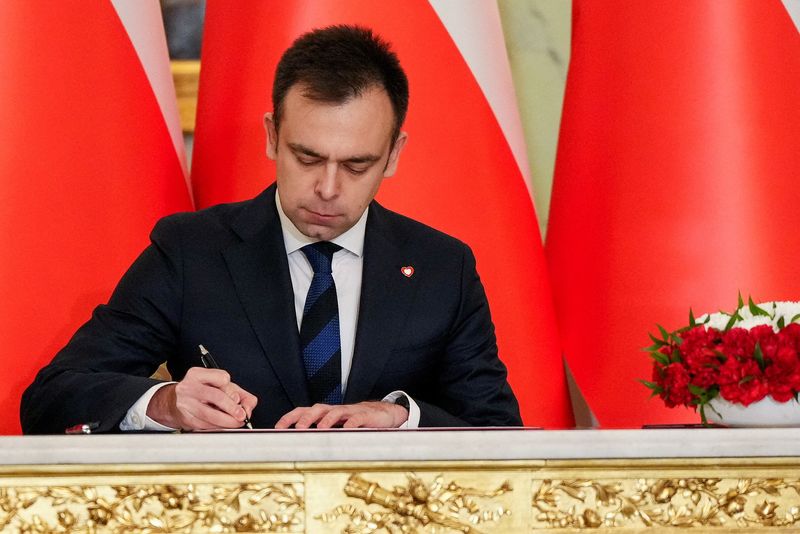By Jan Strupczewski
BRUSSELS (Reuters) – Poland will make joint European Union financing for defence its priority during its six-month presidency of the 27-nation bloc, arguing that security is a common European good, Poland’s Finance Minister Andrzej Domanski said on Wednesday.
The European Commission has estimated the cost of boosting the EU’s defence capabilities at 500 billion euros ($525 billion) or more over the next 10 years.
EU finance ministers will discuss possible financing models in April in Warsaw, Domanski said.
“I believe that security is a common good, therefore we need a common solution. There must be a European solution,” Domanski said before Poland takes charge in January.
Without saying how much money was needed, he noted that large projects, like a European air defence system, were not only about money but also about cooperation between nations.
He also stressed the need for more efficiency, pointing to Europe’s 12 different tank systems as “insane”.
Any joint financing model would most likely entail new joint EU borrowing, a highly controversial idea in Europe’s largest economy Germany which faces legal obstacles to joint debt.
Diplomats say legal issues can only be bypassed if new borrowing were a one-off response to an emergency, like after COVID-19.
POSSIBLE OPTIONS
Diplomats said talks were along two main strands: one that would involve the EU’s long-term budget as security for new borrowing, following the model for the EU’s post-COVID 800 billion euro recovery fund.
The other option is a special purpose vehicle with paid-in capital that would borrow against that capital, modelled on the euro zone bailout fund, the European Stability Mechanism (ESM), which can lend up to 500 billion euros.
The option involving the EU budget would present more difficulties, because it would require unanimity of all 27 EU countries, limit participants to EU members and put the European Commission in charge – a prospect some countries do not relish in the context of defence policy.
Creating an SPV would let the EU invite other nations like Britain and Norway, keep the scheme under control of governments rather than the Commission, and keep the debt raised off the balance sheet of governments.
“From my talks with other ministers of finance, there is a broad support for the view that we need to do way more as Europe,” Domanski said. “There are a couple of solutions on the table. I think it’s way premature to decide which of them would be chosen.”
The size of the EU’s financing needs will be better understood after the publication of a report by new EU Defence Commissioner Andrius Kubilius, due by early March, spelling out what defence efforts should focus on.
For now, discussions on financing options are at an early stage. “We may be starting to tie our shoes before going to the starting blocks,” one EU diplomat said.
($1 = 0.9519 euros)



